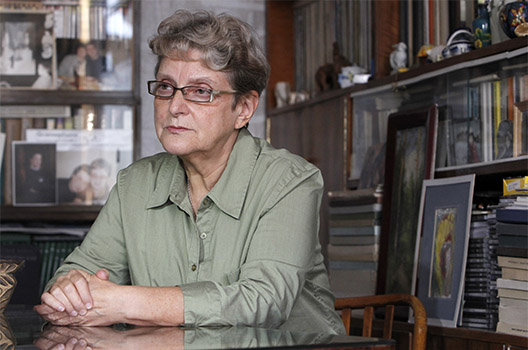
A Mathematics Professor Leads Dissenters
Current and former official human rights advisors to President Vladimir Putin have issued a report that undermines his claim to have legitimately annexed Crimea – and they caused a stir this week by posting it on a Kremlin website. Three activists, including one current and one former member of the Presidential Council for Civil Society and Human Rights, wrote that only 15 to 30 percent of Crimea’s voters supported unification with Russia in the March 16 referendum there — not the 82 percent cited by Putin and the Russian-backed Crimean authorities.
The dissent came from Yevgeniy Bobrov, a human rights lawyer who is listed by the Kremlin among the sixty-one members named on its human rights council; from Svetlana Gannushkina, a former member of the council who helps lead the human rights group Memorial; and from a St. Petersburg lawyer, Olga Zeitlin. They published a 2,300-word report on Crimea on April 21 after a fact-finding visit in which Gannushkina says they interviewed 20 people over three and a half days. Their report, which they had posted on the website of presidential council focuses on the legal and practical problems facing Crimeans following the Russian annexation, as well as the suppression of independent media and the rise in Crimea of political and ethnic tensions.
The activists’ report includes one paragraph on the referendum that declares, “In the opinion of practically all specialists and citizens interviewed” the referendum vote in Sevastopol, the home port of Russia’s Black Sea navy fleet, was an “overwhelming majority … for unification with Russia.” But outside of that city, which is a jurisdiction separate from the rest of Crimea, “according to various data, 50-60 percent of participating voters chose unification with Russia, with a total turnout of 30-50 percent.” The Crimean leadership installed with the help of Russian troops issued an official vote result claiming a massive 81.3 percent turnout with 96.77 percent voting for annexation.
The report adds that “Crimea’s residents voted not as much for unification with Russia as to stop, in their words, ‘the corrupt lawlessness and the dominance of theft by the Donetsk henchmen,’ ” a reference to provincial-level officials sent to Crimea during the 2010-2014 administration of the ousted Ukrainian president, Viktor Yanukovych.
The posting of the activists’ report on the presidential council’s website underscores the divisions, already known, within the Kremlin-authorized human rights community over Moscow’s seizure of Crimea. On March 2, twenty-eight human rights council members signed a declaration opposing the forceful takeover there (a document that also is still posted on the Russian presidential website).
The statement by Bobrov, Gannushkina and Zeitlin was overplayed in a May 5 article by Forbes that characterized the report as an “accidental” publication of the real referendum data by the full council, instead of an estimate, based on interviews, by activists who include one of the council’s members.
A prominent critic of Putin’s takeover in Crimea has been Gannushkina, a 71-year-old grandmother and retired mathematics professor who for years has organized to protect the rights of migrant laborers and people uprooted by wars in Chechnya and elsewhere. In an April 24 article in the independent newspaper Novaya Gazeta (and translated to English by the UK-based group Rights in Russia), Gannushkina wrote sympathetically of thousands of Crimeans who do not want Russian citizenship, but who can get no information from the new local authorities about whether they will even be allowed to remain in Crimea if they keep their Ukrainian citizenship.
“It goes without saying that people who have chosen to refuse Russian citizenship are the most active citizens in the Crimea,” Gannushkina wrote. “They have chosen consciously, understanding what they are risking, and preparing for resistance. Among them there are Russians and Tatars. These people are defending their dignity and their right to decide their own fate.”
“I remain firm in my belief that Russia’s annexation of the Crimea was unlawful, since it violated all manner of international agreements,” Gannushkina added. Russian bloggers and commentators loyal to the Kremlin have called her and colleagues traitorous “fifth columnists” for their criticism of Putin’s Crimea policy.
James Rupert is managing editor at the Atlantic Council.
Image: Svetlana Gannushkina, 71, a mathematician, human rights activist and grandmother, served on Vladimir Putin's human rights advisory council. Gannushkina, shown at her home in 2011, visited Crimea last month and declared Russia's annexation of that territory "unlawful." Russian nationalists have accused her of treason. REUTERS/Denis Sinyakov
